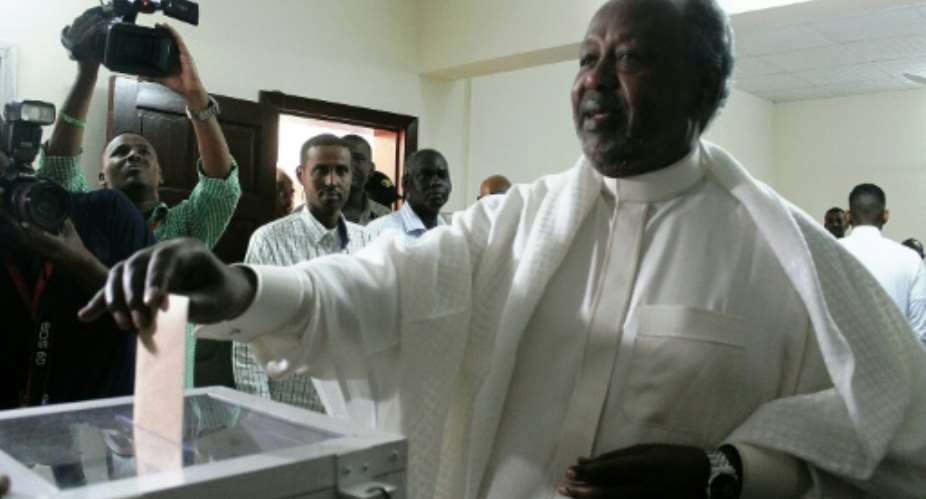Djibouti (AFP) - Djibouti's opposition lashed out at President Ismail Omar Guelleh on Saturday after he claimed a landslide victory in the strategic African nation's election, accusing him of stealing the ballot in an "electoral hold-up".
Friday's vote, which activists complained was preceded by political repression and curbs on basic freedoms, saw Guelleh -- in power since 1999 -- winning 86.68 percent of ballots cast, according to the interior ministry.
Facing a fractured opposition, Guelleh had been widely expected to extend his iron-fisted rule with a fourth term in the tiny Horn of Africa country that has attracted the US, France and China as a prime location for military bases.
The closest opposition candidate won just over seven percent of the vote in a race where some 187,000 people -- around a fourth of the population -- were eligible to cast a ballot.
Some opposition parties had called for a boycott, as they had done in previous votes, but turnout was reported to be 68 percent.
"The people of Djibouti have again entrusted me with the state's highest office," the 68-year-old Guelleh said in a speech on national TV, vowing to get straight back to work.
Mohamed Tourtour, one of the five candidates who ran against Guelleh, said the president's winning total was "far from reality".
"It's an electoral hold-up. Mr Omar Guelleh has stolen this election -- it is not the expression of the people's will," Tourtour said.
Guelleh's nearest rival, Omar Elmi Khaireh, said the official results were "a fantasy" but admitted that legal challenges had little chance of success.
- Strategic importance -
Several opposition candidates complained that their representatives had been turned away from a number of voting centres on polling day.
"We demand that the government fix this and organise transparent, free, fair and just elections," independent candidate Jama Abderahaman Djama told AFP.
With a population of 875,000 people, Djibouti is little more than a port with a country attached, but the former French colony has leveraged its position on one of the world's busiest shipping routes.
It is home to Washington's only permanent base in Africa, which is used for operations in Yemen -- just across the Gulf of Aden -- as well as the fight against the Islamist Shebab in Somalia and Al-Qaeda in the Arabian Peninsula (AQAP).
Guelleh won the previous election in 2011 with 80 percent of the vote, after parliament changed the constitution to clear the way for a third term.
Following parliamentary elections in 2013 which Guelleh's UMP party won, sparking furious opposition claims of fraud, rival parties demanded the creation of an independent electoral commission -- which has never happened.
Opposition groups complained of curbs on freedom of assembly ahead of the vote, while rights groups denounced political repression and crackdowns on basic freedoms.
This week a BBC team was detained, interrogated and then expelled after interviewing an opposition leader.
Djibouti has launched major infrastructure projects aimed at turning it into a regional hub for trade and services, using money largely borrowed from China, which is planning to build a military base there.
Despite the investment and perky economic growth, four out of five people live in poverty.





 There’s nothing you can do for us; just give us electricity to save our collapsi...
There’s nothing you can do for us; just give us electricity to save our collapsi...
 Ghanaian media failing in watchdog duties — Sulemana Braimah
Ghanaian media failing in watchdog duties — Sulemana Braimah
 On any scale, Mahama can't match Bawumia — NPP Youth Organiser
On any scale, Mahama can't match Bawumia — NPP Youth Organiser
 Never tag me as an NPP pastor; I'm 'pained' the 'Akyem Mafia' are still in charg...
Never tag me as an NPP pastor; I'm 'pained' the 'Akyem Mafia' are still in charg...
 Your refusal to dedicate a project to Atta Mills means you never loved him — Kok...
Your refusal to dedicate a project to Atta Mills means you never loved him — Kok...
 2024 elections: I'm competent, not just a dreamer; vote for me — Alan
2024 elections: I'm competent, not just a dreamer; vote for me — Alan
 2024 elections: Forget NPP, NDC; I've the Holy Spirit backing me and nothing wil...
2024 elections: Forget NPP, NDC; I've the Holy Spirit backing me and nothing wil...
 2024 elections: We've no trust in judiciary; we'll ensure ballots are well secur...
2024 elections: We've no trust in judiciary; we'll ensure ballots are well secur...
 Performance tracker: Fire MCEs, DCEs who document Mahama's projects; they're not...
Performance tracker: Fire MCEs, DCEs who document Mahama's projects; they're not...
 Train crash: Railway ministry shares footage of incident
Train crash: Railway ministry shares footage of incident
